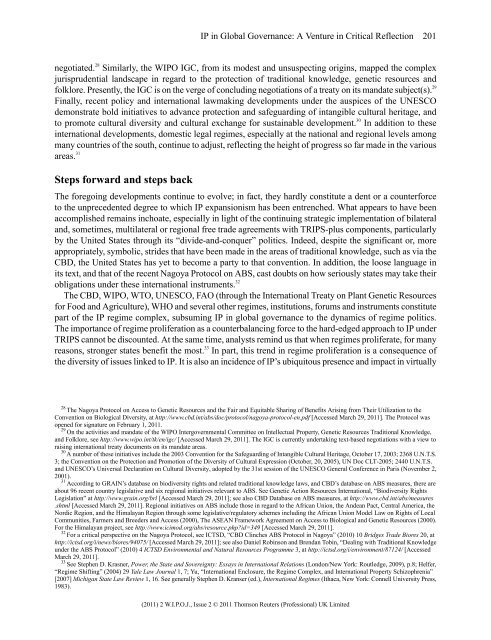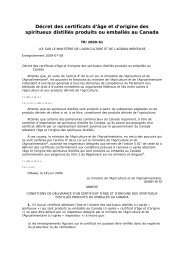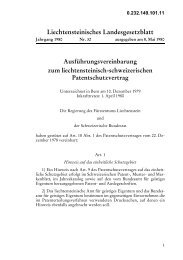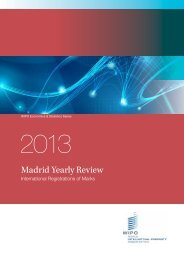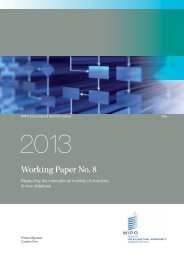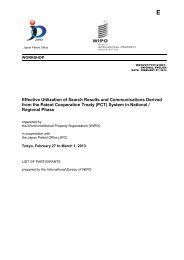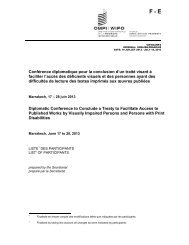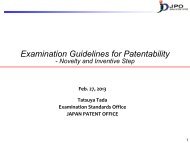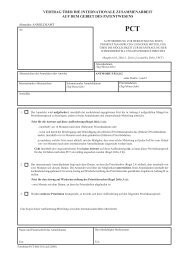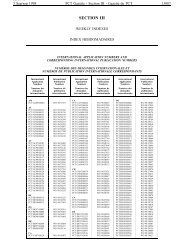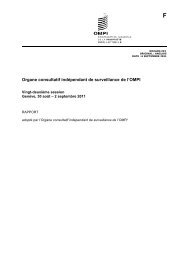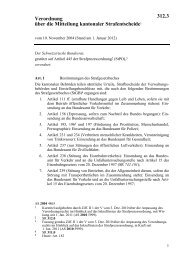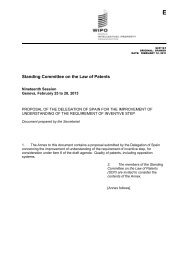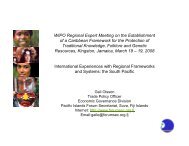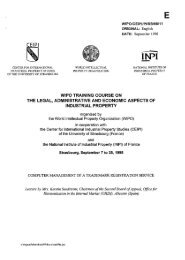WIPO Journal - World Intellectual Property Organization
WIPO Journal - World Intellectual Property Organization
WIPO Journal - World Intellectual Property Organization
You also want an ePaper? Increase the reach of your titles
YUMPU automatically turns print PDFs into web optimized ePapers that Google loves.
negotiated. 28 Similarly, the <strong>WIPO</strong> IGC, from its modest and unsuspecting origins, mapped the complex<br />
jurisprudential landscape in regard to the protection of traditional knowledge, genetic resources and<br />
folklore. Presently, the IGC is on the verge of concluding negotiations of a treaty on its mandate subject(s). 29<br />
Finally, recent policy and international lawmaking developments under the auspices of the UNESCO<br />
demonstrate bold initiatives to advance protection and safeguarding of intangible cultural heritage, and<br />
to promote cultural diversity and cultural exchange for sustainable development. 30 In addition to these<br />
international developments, domestic legal regimes, especially at the national and regional levels among<br />
many countries of the south, continue to adjust, reflecting the height of progress so far made in the various<br />
areas. 31<br />
Steps forward and steps back<br />
IP in Global Governance: A Venture in Critical Reflection 201<br />
The foregoing developments continue to evolve; in fact, they hardly constitute a dent or a counterforce<br />
to the unprecedented degree to which IP expansionism has been entrenched. What appears to have been<br />
accomplished remains inchoate, especially in light of the continuing strategic implementation of bilateral<br />
and, sometimes, multilateral or regional free trade agreements with TRIPS-plus components, particularly<br />
by the United States through its “divide-and-conquer” politics. Indeed, despite the significant or, more<br />
appropriately, symbolic, strides that have been made in the areas of traditional knowledge, such as via the<br />
CBD, the United States has yet to become a party to that convention. In addition, the loose language in<br />
its text, and that of the recent Nagoya Protocol on ABS, cast doubts on how seriously states may take their<br />
obligations under these international instruments. 32<br />
The CBD, <strong>WIPO</strong>, WTO, UNESCO, FAO (through the International Treaty on Plant Genetic Resources<br />
for Food and Agriculture), WHO and several other regimes, institutions, forums and instruments constitute<br />
part of the IP regime complex, subsuming IP in global governance to the dynamics of regime politics.<br />
The importance of regime proliferation as a counterbalancing force to the hard-edged approach to IP under<br />
TRIPS cannot be discounted. At the same time, analysts remind us that when regimes proliferate, for many<br />
reasons, stronger states benefit the most. 33 In part, this trend in regime proliferation is a consequence of<br />
the diversity of issues linked to IP. It is also an incidence of IP’s ubiquitous presence and impact in virtually<br />
28 The Nagoya Protocol on Access to Genetic Resources and the Fair and Equitable Sharing of Benefits Arising from Their Utilization to the<br />
Convention on Biological Diversity, at http://www.cbd.int/abs/doc/protocol/nagoya-protocol-en.pdf [Accessed March 29, 2011]. The Protocol was<br />
opened for signature on February 1, 2011.<br />
29 On the activities and mandate of the <strong>WIPO</strong> Intergovernmental Committee on <strong>Intellectual</strong> <strong>Property</strong>, Genetic Resources Traditional Knowledge,<br />
and Folklore, see http://www.wipo.int/tk/en/igc/ [Accessed March 29, 2011]. The IGC is currently undertaking text-based negotiations with a view to<br />
raising international treaty documents on its mandate areas.<br />
30 A number of these initiatives include the 2003 Convention for the Safeguarding of Intangible Cultural Heritage, October 17, 2003; 2368 U.N.T.S.<br />
3; the Convention on the Protection and Promotion of the Diversity of Cultural Expression (October, 20, 2005), UN Doc CLT-2005; 2440 U.N.T.S.<br />
and UNESCO’s Universal Declaration on Cultural Diversity, adopted by the 31st session of the UNESCO General Conference in Paris (November 2,<br />
2001).<br />
31 According to GRAIN’s database on biodiversity rights and related traditional knowledge laws, and CBD’s database on ABS measures, there are<br />
about 96 recent country legislative and six regional initiatives relevant to ABS. See Genetic Action Resources International, “Biodiversity Rights<br />
Legislation” at http://www.grain.org/brl [Accessed March 29, 2011]; see also CBD Database on ABS measures, at http://www.cbd.int/abs/measures<br />
.shtml [Accessed March 29, 2011]. Regional initiatives on ABS include those in regard to the African Union, the Andean Pact, Central America, the<br />
Nordic Region, and the Himalayan Region through some legislative/regulatory schemes including the African Union Model Law on Rights of Local<br />
Communities, Farmers and Breeders and Access (2000), The ASEAN Framework Agreement on Access to Biological and Genetic Resources (2000).<br />
For the Himalayan project, see http://www.icimod.org/abs/resource.php?id=349 [Accessed March 29, 2011].<br />
32 For a critical perspective on the Nagoya Protocol, see ICTSD, “CBD Clinches ABS Protocol in Nagoya” (2010) 10 Bridges Trade Biores 20, at<br />
http://ictsd.org/i/news/biores/94075/ [Accessed March 29, 2011]; see also Daniel Robinson and Brendan Tobin, “Dealing with Traditional Knowledge<br />
under the ABS Protocol” (2010) 4 ICTSD Environmental and Natural Resources Programme 3, at http://ictsd.org/i/environment/87124/ [Accessed<br />
March 29, 2011].<br />
33 See Stephen D. Krasner, Power, the State and Sovereignty: Essays in International Relations (London/New York: Routledge, 2009), p.8; Helfer,<br />
“Regime Shifting” (2004) 29 Yale Law <strong>Journal</strong> 1, 7; Yu, “International Enclosure, the Regime Complex, and International <strong>Property</strong> Schizophrenia”<br />
[2007] Michigan State Law Review 1, 16. See generally Stephen D. Kranser (ed.), International Regimes (Ithaca, New York: Connell University Press,<br />
1983).<br />
(2011) 2 W.I.P.O.J., Issue 2 © 2011 Thomson Reuters (Professional) UK Limited


